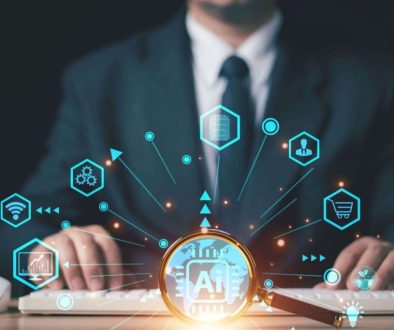The Future of the Web: How Technology Is Shaping the Next Digital Era
The internet has always been a rapidly evolving space, but the pace of change in the 2020s is unprecedented. What began as a network for academic sharing has grown into the foundation of the global economy, communication, and entertainment. Today, the web is entering a new era defined by artificial intelligence (AI), decentralization, immersive technologies, and stronger demands for security and privacy.
In this article, we will explore the major tech and web trends shaping 2025 and beyond—from Web3 and AI integration to cybersecurity, cloud computing, and user experience innovation.
Web3 and the Decentralized Internet
One of the most talked-about developments in the tech world is the rise of Web3. Unlike the centralized model of Web2—where large corporations like Google, Amazon, and Meta control vast portions of online data—Web3 envisions a decentralized web built on blockchain technology.
-
Ownership of Data: In Web3, users can own their digital identities and assets without relying on intermediaries. This could fundamentally shift power away from tech giants and toward individuals.
-
Decentralized Applications (dApps): These apps run on blockchain networks rather than centralized servers, reducing single points of failure and increasing transparency.
-
Digital Assets & NFTs: While hype around NFTs has cooled, the underlying technology continues to influence industries like gaming, art, and digital rights management.
Web3 is still in its early stages, but it represents a profound change in how the internet might operate. Businesses are experimenting with blockchain-powered solutions in finance, supply chains, and content creation.
Artificial Intelligence as a Core Web Technology
Artificial intelligence is no longer just powering chatbots or recommendation engines—it is now a core layer of the internet. AI is influencing nearly every aspect of the web:
-
Search Engines: AI-powered search tools are becoming more conversational and context-aware, moving beyond keyword matching to deliver personalized results.
-
Content Creation: Tools powered by natural language processing can generate articles, marketing copy, and even code, making web development faster and more accessible.
-
User Experience: AI analyzes behavior patterns to provide adaptive websites that respond to individual user needs.
-
Cybersecurity: Machine learning models are being deployed to detect threats in real time, protecting sensitive data from increasingly sophisticated attacks.
As AI becomes more integrated into web platforms, questions around ethics, data usage, and transparency are also growing. Regulatory frameworks will play a key role in determining how AI reshapes the online ecosystem.

The Rise of Immersive Web Experiences
The line between the physical and digital world is blurring thanks to augmented reality (AR), virtual reality (VR), and mixed reality (MR). Together, these technologies are creating what many call the immersive web.
-
E-commerce: AR is allowing customers to “try on” clothes, preview furniture in their living rooms, or test car configurations before purchase.
-
Education & Training: Virtual classrooms and simulations are making learning more engaging and accessible.
-
Entertainment & Social Media: The metaverse—while still evolving—shows how VR and AR can reshape social interaction and gaming.
These immersive technologies depend heavily on high-speed internet, cloud computing, and powerful hardware, but they signal a major shift in how we will interact with online platforms.
Cybersecurity: The Rising Priority of the Web
With digital transformation accelerating, cybersecurity has become one of the most pressing concerns for businesses, governments, and individuals alike. Data breaches, ransomware attacks, and phishing schemes are making headlines almost daily.
Key trends in web security include:
-
Zero-Trust Architecture: Businesses are adopting “never trust, always verify” security models to protect data across remote work environments.
-
Encryption & Privacy Tools: Demand for stronger data protection is leading to widespread adoption of advanced encryption methods and privacy-focused web browsers.
-
AI-Driven Security: As threats become more complex, machine learning is being used to predict and prevent attacks in real time.
-
Regulation & Compliance: Governments are enforcing stricter data protection laws, such as the EU’s GDPR and similar frameworks in Asia and the U.S.
Security is no longer just a technical issue—it’s a business imperative. Companies that fail to secure user data risk reputational damage and regulatory fines.
Cloud Computing and Edge Technology
The backbone of the modern web continues to be cloud computing, which has enabled businesses of all sizes to scale quickly, cut costs, and access powerful tools. But now, edge computing is emerging as the next phase.
-
Cloud Services: Companies are moving entire infrastructures online, relying on providers like AWS, Microsoft Azure, and Google Cloud.
-
Edge Computing: By processing data closer to the source (such as IoT devices), edge computing reduces latency, improves performance, and supports real-time applications.
-
Hybrid Models: Many businesses are combining cloud and edge solutions to maximize flexibility and efficiency.
These technologies will be critical for supporting AI applications, immersive experiences, and the Internet of Things (IoT).
The User Experience (UX) Revolution
The web is becoming increasingly user-centric, with businesses recognizing that design and accessibility are just as important as content and functionality.
-
Personalization: Websites now use AI-driven insights to customize layouts, recommendations, and content based on user behavior.
-
Accessibility: Inclusive design ensures that people with disabilities can navigate websites easily, a growing priority as accessibility regulations expand worldwide.
-
Mobile-First Design: With the majority of global traffic coming from mobile devices, businesses are focusing on responsive, lightweight, and mobile-optimized sites.
-
Speed & Performance: Search engines now penalize slow-loading websites, making optimization a critical part of web strategy.
UX is no longer an afterthought—it is a direct driver of revenue and customer loyalty.
Evolving Digital Economy
The internet continues to power the global economy, with e-commerce, fintech, and digital services expanding rapidly.
-
E-Commerce Growth: Online shopping is booming, with social commerce (purchases made directly through social media platforms) growing particularly fast.
-
Fintech Innovation: Digital wallets, blockchain-based banking, and decentralized finance (DeFi) are reshaping how consumers and businesses manage money.
-
Gig Economy Platforms: Freelancing, remote work, and digital marketplaces are redefining traditional employment.
The digital economy is creating opportunities for startups and small businesses to compete on a global scale.
Challenges Facing the Tech/Web Space
Despite rapid progress, several challenges threaten the future of the web:
-
Regulation and Policy: Governments are struggling to balance innovation with oversight, particularly regarding AI, privacy, and blockchain.
-
Digital Divide: Billions of people worldwide still lack reliable internet access, raising concerns about inequality in the digital era.
-
Ethical Questions: From AI bias to the environmental impact of data centers, ethical issues must be addressed for the web to evolve responsibly.
These challenges highlight the importance of collaboration between governments, businesses, and civil society to ensure the web benefits everyone.
Looking Ahead: The Next Decade of the Web
The future of the web will be shaped by convergence—where AI, blockchain, immersive technologies, and cloud solutions work together to create smarter, faster, and more user-centric digital experiences. Businesses will compete not only on products and services but also on trust, transparency, and responsibility.
The web of tomorrow promises incredible opportunities, but it also demands vigilance. Organizations that adapt to technological trends while maintaining strong values around security, ethics, and accessibility will be best positioned to thrive.

Conclusion
The tech and web industries are at a critical turning point. Web3, artificial intelligence, immersive experiences, cybersecurity, and cloud-edge integration are reshaping the internet into something far more powerful and interactive than ever before. At the same time, challenges like regulation, inequality, and ethical dilemmas must be addressed.
For businesses, developers, and users alike, the coming years will bring both disruption and opportunity. The future of the web is not just about technology—it’s about building a digital world that is secure, inclusive, and sustainable for all.




